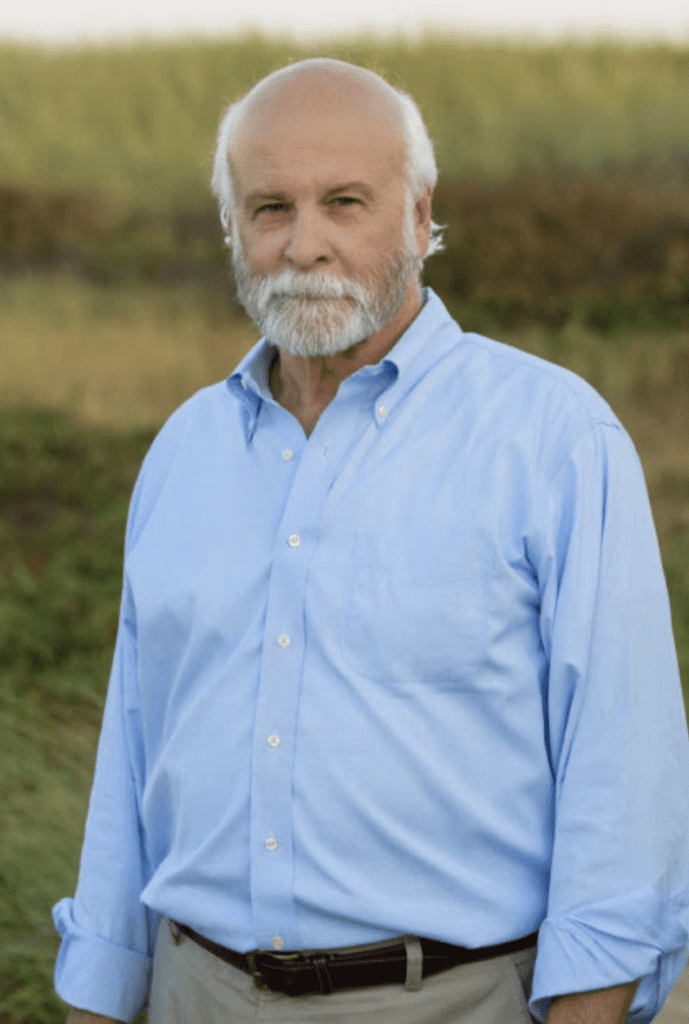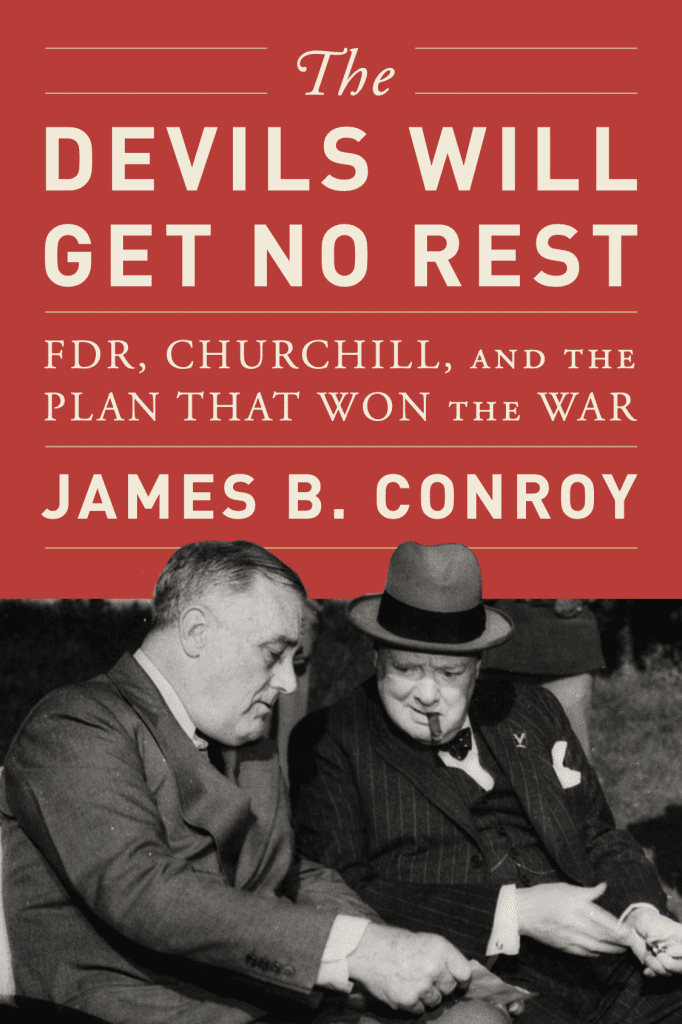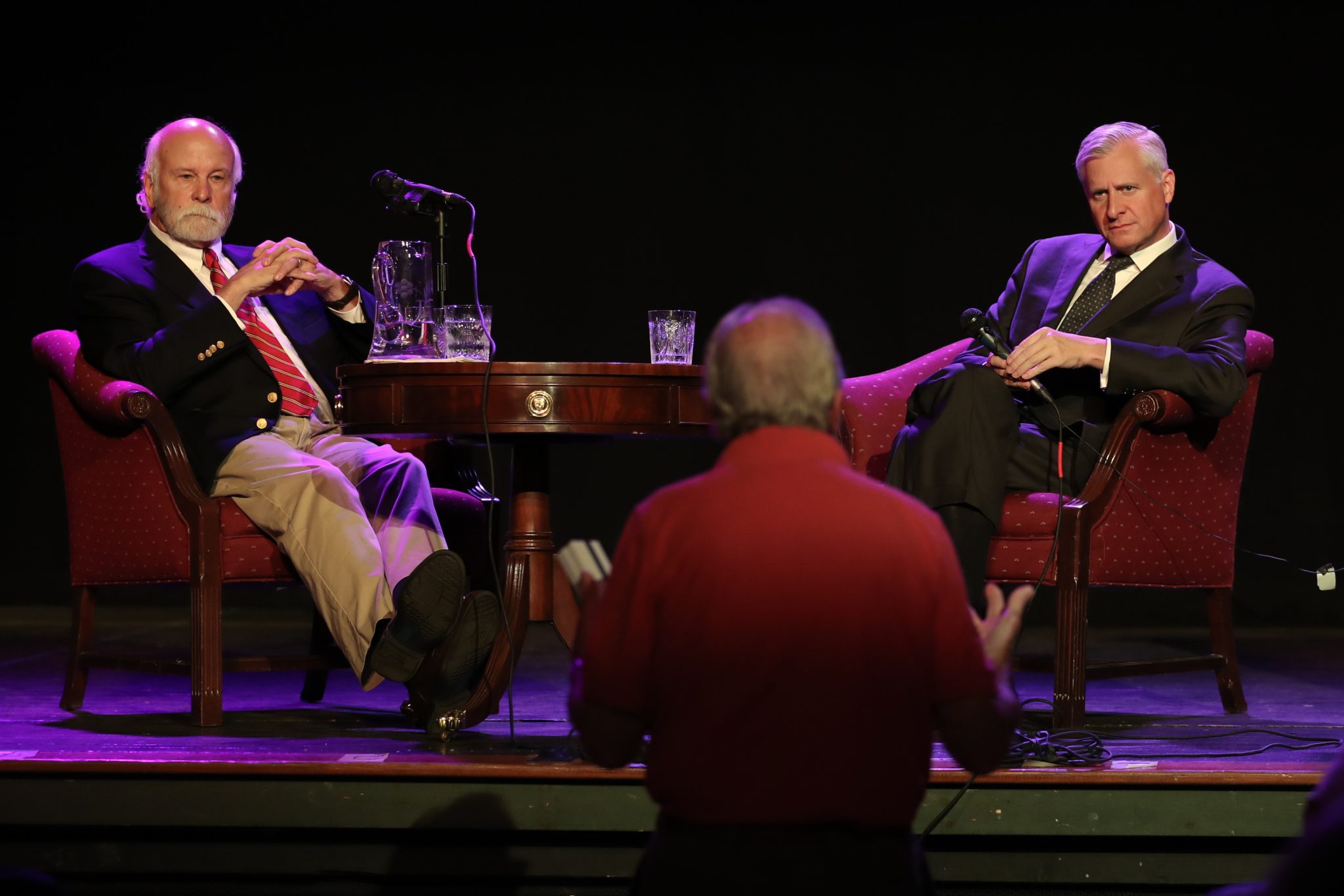
May 11, 2023 By Carol Britton Meyer
Award-winning author Jim Conroy, a 40-year Hingham resident, a former chair of the Advisory Committee and former member of the Historical Commission, has authored four prominent books of narrative history — including his latest spellbinding release entitled “The Devils Will Get No Rest: FDR, Churchill, and the Plan that Won the War,” set in Casablanca during a pivotal time in world history.
The book, published by Simon & Schuster, tells the compelling story of the Casablanca Conference of January 1943 — the secret, no-holds-barred meeting held in an active Moroccan war zone to plan the defeat of Germany, Italy, and Japan at the turning point of World War II.

This is the first time that this crucial period in world history has been explained in a full-length book, telling the behind-the-scenes story of how the Allies “stared into the face of evil during World War II and forged a winning plan,” Conroy told the Hingham Anchor.
The book has been likened to a master class in military strategy, foreign policy, and high-stakes negotiation. The Pulitzer Prize winning historian Jon Meacham says, “Conroy has brought a pivotal moment in world history to vivid and engaging life” with “sophisticated analysis and an eye for the telling detail.”
It was during the Casablanca Conference that then-United States President Franklin D. Roosevelt, British Prime Minister Winston Churchill, and their divided high command hammered out a winning strategy “after 10 grueling days of sharp disagreement, intense sibling rivalry, and often-heated argument and turned an alliance of convenience into an Anglo-American special relationship as they planned to pivot from a defensive to an offensive war,” Conroy explained.
During that time, Roosevelt, Churchill, Charles de Gaulle, George C. Marshall, Dwight D. Eisenhower, George S. Patton Jr., Sir Alan Brooke, Lord Louis Mountbatten, Sir Harold Alexander, and their military peers “questioned each’s other’s competence, doubted each other’s vision, and argued their way through choices that could win or lose the war.”
Enclosed by barbed wire at a commandeered resort hotel surrounded by fancy villas and overlooking the ocean — protected by British marines and elite American troops and fighter planes flying overhead — these prominent military and political figures ultimately produced a winning strategy.
“The Devils Will Get No Rest” describes in colorful detail how these legendary statesmen, generals, and admirals overcame their differences and shared strategies that transformed their alliance from a necessity to what Conroy calls a “bond” and “forged a war-winning plan.”
This Anglo-American clash over military strategy occurred at a time when World War II could have gone either way, according to Conroy. “Churchill called it the most important Allied conclave of the war.”
Lifelong love of history
Writing award-winning books about important aspects of United States history is especially rewarding since Conroy’s love for history goes back to when he was a young boy — an interest that has remained with him throughout his adult life. “I’ve always been a writer one way or another since college,” he said, including working on Capitol Hill in Washington, D.C. as a speechwriter, a press secretary, and a chief of staff in the 1970s and early 1980s and writing briefs during his 28 years as a lawyer.
“While that work kept my writing skills going, I had always wanted to write about history,” Conroy said. A retired lawyer, he researched and wrote the Casablanca book full-time over a 2-1/2-year timeframe. “Now that I’m retired, I have the time and energy to try to do justice to this challenging subject.”
Conroy first thought about writing a book about the Casablanca Conference after watching a History Channel documentary on this subject years ago.
His interest was piqued at the thought of so many larger-than-life, high-profile military and political figures sitting around the same table in a war zone in an area that had been bombed two weeks earlier. “What nerve and courage it took to put a dozen of the Allies’ most important people in the same room at the same time under those circumstances as they hashed out the next steps for 10 days. It was quite amazing. A single bomb could have taken them all out,” Conroy said. “How could there not be a story there?”
A particularly interesting twist relates to the German spy base in Spain getting wind of the conference and sending a message in Spanish to Berlin regarding the Casablanca meeting. “The Germans translated ‘Casablanca’ as ‘white house’ and thought they were meeting at the White House!” Conroy said. “If they had gotten the location right, things would have turned out quite differently.”
The two biggest issues at the conference, he explained, were how much of American and British resources to invest, respectively, in the war against Japan and the war against Germany and when to invade France.
“The Americans wanted to cross the Channel to get right at them, while the British wanted to wear them down and invade France later,” Conroy explained. “The British were far more sophisticated and experienced, while the Americans had been pretty isolated after World War I.”
When asked how he went about researching “The Devils Will Get No Rest,” Conroy explained that he started out by reading everything he could find that had already been written about the conference and reviewed 400 to 500 pages of minutes from the meeting, along with relevant parts of Churchill, FDR, and Marshall memoirs and those of other main characters “to get their spin and take on what happened there.” Conroy also visited the Franklin D. Roosevelt Presidential Library and Museum in Hyde Park, New York, and many other archives in search of pertinent diaries, letters, and unpublished reports.
When FDR returned to Washington from the conference, he had letters prepared for his signature, addressed to the wives or parents of the soldiers who had guarded him at Casablanca, or prepared and served his meals there, or were buried in the nearby military cemetery he visited, in which the American soldiers and sailors who were killed in the taking of North Africa were buried. Many of the wives and parents wrote touching letters back, and Conroy has woven them into the narrative.
Conroy was able to locate the daughter of one of the WACs (Women’s Army Corps — formerly known as the Women’s Army Auxiliary Corps) who served as secretaries during the Casablanca Conference. “She had all her mother’s letters, diaries, and photographs — including one of her with Churchill — and details about having dinner with Churchill, FDR, and other big figures and what a wonderful time they had.” This too is featured in the book.

Book events planned
Book talks are planned during a private Hingham Historical Society event May 23 and for the public at Hingham Public Library May 31 at 7 p.m. prior to a national book tour that will include New York, Boston, Philadelphia, Dallas, Charleston, and other locations.
During the Historical Society event, Roy Harris, a Hingham resident and retired Wall Street Journal reporter, will discuss the book with Conroy, who is an Honorary Fellow of the Massachusetts Historical Society and is also on the Hingham Historical Society board.
Conroy’s first book, “Our One Common Country,” was a finalist for the prestigious Gilder Lehrman Lincoln Prize. His second, “Lincoln’s White House,” shared the Lincoln Prize and won the Abraham Lincoln Institute’s annual book award. His third book, acclaimed by leading Jefferson historians, is entitled “Jefferson’s White House: Monticello on the Potomac.”
Conroy, a former member of the Community Preservation Committee, Government Study Committee, and Task Force on Affordability, served for six years in the Naval Air Reserve. He graduated magna cum laude from the Georgetown University Law Center and practiced law in Boston until 2020.
With two Hingham events and a book tour occupying his free time for now, Conroy has not yet decided the subject of his next book. He lives with his wife, Lynn Fitzgerald Conroy, in Hingham, where they raised their two children, Scott and Erin Conroy.
For more information, go to https://jamesbconroy.com/.

